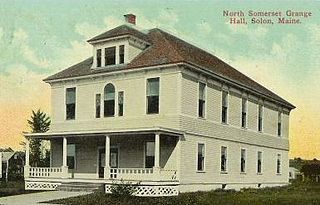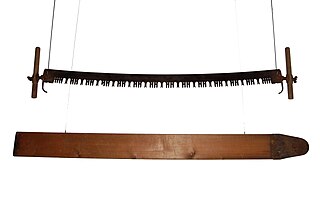Related Research Articles
The Anti-Masonic Party, also known as the Anti-Masonic Movement, was the first third party in the United States. It strongly opposed Freemasonry as a single-issue party and later aspired to become a major party by expanding its platform to take positions on other issues. After emerging as a political force in the late 1820s, most of the Anti-Masonic Party's members joined the Whig Party in the 1830s and the party disappeared after 1838.

The United States Secret Service is a federal law enforcement agency under the Department of Homeland Security charged with conducting criminal investigations and protecting the nation's leaders, their families, and visiting heads of state or government. Until 2003, the Secret Service was part of the Department of the Treasury, as the agency was founded in 1865 to combat the then-widespread counterfeiting of U.S. currency.

A secret society is a club or an organization whose activities, events, inner functioning, or membership are concealed from non-members. The society may or may not attempt to conceal its existence. The term usually excludes covert groups, such as intelligence agencies or guerrilla warfare insurgencies, that hide their activities and memberships but maintain a public presence.

The Grange, officially named The National Grange of the Order of Patrons of Husbandry, is a fraternal organization in the United States that encourages families to band together to promote the economic and political well-being of the community and agriculture. The Grange, founded after the Civil War in 1867, is the oldest American agricultural advocacy group with a national scope. The Grange actively lobbied state legislatures and Congress for political goals, such as the Granger Laws to lower rates charged by railroads, and rural free mail delivery by the Post Office.

A forced disappearance occurs when a person is secretly abducted or imprisoned by a state or political organization, or by a third party with the authorization, support, or acquiescence of a state or political organization, followed by a refusal to acknowledge the person's fate and whereabouts, with the intent of placing the victim outside the protection of the law.
The Ancient and Honorable Order of E Clampus Vitus (ECV) is a fraternal organization dedicated to the preservation of the heritage of the American West, especially the history of the Mother Lode and gold mining regions of the area. There are chapters in California, Nevada, Arizona, Colorado, Utah, Washington, Idaho, Oregon, Montana and Outposts in other western states. Members call themselves "Clampers." The organization's name is in Dog Latin, and has no known meaning; even the spelling is disputed, sometimes appearing as "Clampus," "Clampsus," or "Clampsis." The motto of the Order, Credo Quia Absurdum, is generally interpreted as meaning "I believe it because it is absurd;" the proper Latin quotation Credo quia absurdum est, is from the Christian apologist Tertullian, who rejected rationalism and accepted a Gospel which addressed itself to the "non-rational levels of perception."

A crosscut saw is any saw designed for cutting wood perpendicular to (across) the wood grain. Crosscut saws may be small or large, with small teeth close together for fine work like woodworking or large for coarse work like log bucking, and can be a hand tool or power tool.

Free silver was a major economic policy issue in late-19th-century America. Its advocates were in favor of an expansionary monetary policy featuring the unlimited coinage of silver into money on demand, as opposed to strict adherence to the more carefully fixed money supply implicit in the gold standard. Supporters of an important place for silver in a bimetallic money system making use of both silver and gold, called "Silverites", sought coinage of silver dollars at a fixed weight ratio of 16-to-1 against dollar coins made of gold. Because the actual price ratio of the two metals was substantially higher in favor of gold at the time, most economists warned that the less valuable silver coinage would drive the more valuable gold out of circulation.

The American Protective Association (APA) was an American anti-Catholic secret society established in 1887 by Protestants. The organization was the largest anti-Catholic movement in the United States during the later part of the 19th century, showing particular regional strength in the Midwest. The group grew rapidly during the early 1890s before collapsing just as abruptly in the aftermath of the election of 1896.
The International Day of the Disappeared, on August 30 of each year, is a day created to draw attention to the fate of individuals imprisoned at places and under poor conditions unknown to their relatives and/or legal representatives. The impulse for the day came from the Latin American Federation of Associations for Relatives of Detained-Disappeared (Federación Latinoamericana de Asociaciones de Familiares de Detenidos-Desaparecidos, or FEDEFAM), a non-governmental organization founded in 1981 in Costa Rica as an association of local and regional groups actively working against secret imprisonment, forced disappearances and abduction in a number of Latin-American countries.

The Benevolent and Protective Order of Elks is an American fraternal order founded in 1868 originally as a social club in New York City.
Democratic-Republican Societies were local political organizations formed in the United States in 1793-94 to promote republicanism and democracy and to fight aristocratic tendencies. Historians use the term "Democratic-Republican" to describe the societies, but the societies rarely ever used the name "Democratic-Republican." They called themselves "Democratic," "Republican," "True Republican," "Constitutional," "United Freeman," "Patriotic," "Political," "Franklin," and "Madisonian."
The North American fraternity and sorority system began with students who wanted to meet secretly, usually for discussions and debates not thought appropriate by the faculty of their schools. Today they are used as social, professional, and honorary groups that promote varied combinations of community service, leadership, and academic achievement.

A fraternity or fraternal organization is an organization, society, club or fraternal order traditionally of men associated together for various religious or secular aims. Fraternity in the Western concept developed in the Christian context, notably with the religious orders in the Catholic Church during the Middle Ages. The concept was eventually further extended with medieval confraternities and guilds. In the early modern era, these were followed by fraternal orders such as freemasons and odd fellows, along with gentlemen's clubs, student fraternities, and fraternal service organizations. Members are occasionally referred to as a brother or – usually in religious context – Frater or Friar.
A law enforcement agency (LEA), in North American English, is any government agency responsible for the enforcement of the laws.
Secretary is a title often used in organizations to indicate a person having a certain amount of authority, power, or importance in the organization. Secretaries announce important events and communicate to the organization. The term is derived from the Latin word secernere, "to distinguish" or "to set apart", the passive participle meaning "having been set apart", with the eventual connotation of something private or confidential, as with the English word secret. A secretarius was a person, therefore, overseeing business confidentially, usually for a powerful individual.
The Improved Benevolent Protective Order of Elks of the World (IBPOEW) is an African-American fraternal order modeled on the Benevolent and Protective Order of Elks. It was established in 1897 in the United States. In the early 21st century, it has 500,000 members and 1500 lodges in the world.
Enforced disappearances in Pakistan originated during the military dictator General Pervez Musharraf. The practice continued during subsequent governments. The term missing persons is sometimes used as a euphemism. According to Amina Masood Janjua, a human rights activist and chairperson of Defence of Human Rights Pakistan; a not for profit organization working against enforced disappearance there are more than 5,000 reported cases of enforced disappearance in Pakistan. This is a form of targeted killings and state sponsorship of terrorism of its own citizens by The Establishment specially against the civilian nationalists such as Baloch, Sindhi, Pashtun, Punjabis, Muhajir Hazara, Ahmadiya, Shias.

The woman's club movement was a social movement that took place throughout the United States that established the idea that women had a moral duty and responsibility to transform public policy. While women's organizations had always been a part of United States history, it was not until the Progressive era that it came to be considered a "movement." The first wave of the club movement during the Progressive era was started by white, middle-class, Protestant women and a second phase by African-American women.
References
- ↑ Stevens, Albert C. The Cyclopædia of Fraternities; a compilation of existing authentic information and the results of original investigation as to more than six hundred secret societies in the United States New York city, Paterson, N.J., Hamilton printing and publishing company p.301
- ↑ Berger, Knute. “A Mysterious Disappearance in Wheat Country.” Crosscut, 1 Mar. 2017, crosscut.com/2017/03/a-mysterious-disappearance-in-wheat-country.
- ↑ Preuss, Arthur A Dictionary of Secret and other Societies St. Louis: B. Herder Book Co. 1924 p.137